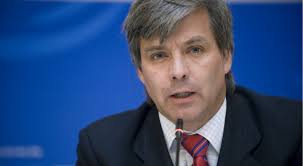By Andrew Warshaw
January 14 – Six months after imposing a seven-year ban on Harold Mayne-Nicholls (pictured), the official who led the technical inspection team that evaluated the credentials of all nine candidates for the 2018 and 2022 World Cups, FIFA’s ethics judges have finally provided more detail as to exactly why the Chilean was hit so hard.
It has long been known that Mayne-Nicholls asked the Qataris for possible work placements for some of his closest relatives at the famed Aspire youth academy in Doha but FIFA’s ethics committee, without mentioning any World Cup bidder by name, has now provided more information as to why this was a serious offense.
Aspire was strongly linked to Qatar’s successful 2022 World Cup bid but Mayne-Nicholls, a former head of Chilean football, has always insisted the inquiry was a sham and that his conduct broke no rules either legally or morally and did not involve any paid work.
Significantly, his technical report actually placed Qatar the bottom of the list in terms of suitability for the World Cup. Despite this, FIFA’s ethics judging chamber took the view that he had violated his responsibilities, revealing that “after visiting one of the bid committees in September, 2010,” Mayne-Nicholls “repeatedly asked for personal favours related to the hosting and training of his relatives (a son, nephew and brother-in-law).”
Explaining why this breached FIFA’s ethics code, including offering or accepting gifts and conflict of interest, the statement continued: “Mr Mayne-Nicholls, in his capacity as chairman of the FIFA Bid Evaluation Group for the World Cups in 2018 and 2022, had a special obligation with regard to the integrity and neutrality of his work. Confidence in the work of the Bid Evaluation Group was especially crucial in order for it to properly exercise its powers and duties.
“Not only were these requests of a private nature, but they were made only a few days after the visit to the Bid Committee, during the time the Bid Evaluation Group of which Mr Mayne-Nicholls was the chairman was still exercising its duties and prior to the election of the hosts for the 2018 and 2022 FIFA World Cups.
“Mr. Mayne-Nicholls did not act in FIFA’s interests and ignored his responsibility as a high-ranking FIFA official, someone who was expected to act with utmost neutrality and integrity, in order to pursue his own personal interests.”
By giving Mayne-Nicholls written grounds for the verdict, he can now finally go through the relevant appeals process. But questions seem certain to be asked as to why it took so long to provide details of this particular judgement, especially when other cases like those of Sepp Blatter and Michel Platini appear to have been completed far more quickly.
Mayne-Nicholls was appointed in 2010 to lead a six-member team evaluating the 2018 and 2022 World Cup bidders. All nine candidates were visited between July and September 2010 and although Mayne-Nicholls flagged eventual 2022 winners Qatar as presenting the most risk as potential hosts, the FIFA executive committee largely ignored his recommendations.
Contact the writer of this story at moc.l1734884257labto1734884257ofdlr1734884257owedi1734884257sni@w1734884257ahsra1734884257w.wer1734884257dna1734884257

